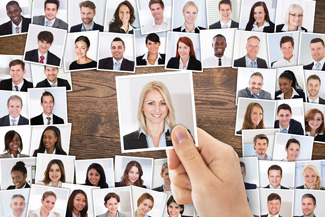How many faces can one person recognize?
 You've probably never asked yourself this question, but no matter, science is here to answer it anyway! Indeed, our facial recognition abilities allow us to identify a great number of people. But just how many? Research published in Acts of the Royal Society B looked into the question and proposed a method for putting forth the following estimate: 5000. Let’s take a closer look.
You've probably never asked yourself this question, but no matter, science is here to answer it anyway! Indeed, our facial recognition abilities allow us to identify a great number of people. But just how many? Research published in Acts of the Royal Society B looked into the question and proposed a method for putting forth the following estimate: 5000. Let’s take a closer look. As a prelude to their study, the authors remind us that for most of history, humans have lived in small, scattered groups. But over the last few centuries, the worldwide population has increased dramatically, and this has consequences on our facial recognition capacities. In addition to all the people we know personally, think about the media figures that we're familiar with through virtual means.
In the research carried out by Rob Jenkins (from the psychology department at the University of York) and his colleagues, it’s not a matter of determining how many faces people could recognize, but rather how many faces people actually recognize. In addition, facial identification must be dissociated from name recognition. For example, we are most likely incapable of recognizing the authors of many of our favorite books. And conversely, we can recognize a face without knowing the person's name.
Since it’s impossible to directly assess the number of faces a person can recognize, the researchers distinguished two categories of faces: faces from the participants’ personal lives (family, friends, coworkers, etc.) with whom they had direct social contact; and the faces of famous people (actors, politicians, musicians, etc.). To compile their database, the scientists measured recognition of these two types of faces during different sessions. For this experiment, they recruited 25 undergraduate students from the universities of Glasgow and Aberdeen in Scotland (average age = 24 years; 15 women, 10 men).
First, each participant was asked to write down all the faces they could recognize. They had to be able to form a clear mental image of each face or be able to recognize it on sight. Of course, the researchers had no way of verifying the accuracy of the participants’ responses, but these criteria were useful for understanding the task. As mentioned earlier, the participants didn’t have to be able to put a name to the face, and semantic descriptions (such as "my mechanic") were accepted. During this first phase, people personally recognized an average of 362 faces (responses varied from 167 to 524). Note that an hour was not enough time to complete the list (participants were still thinking of more faces at the end). From the data collected during these time-limited sessions, and accounting for the decrease in recall rate as the session wore on, the researchers estimated that, without any time constraints, a person could list an average of 549 faces (between 253 and 794).
Second, the students were shown and asked to identify famous people, 3,441 in total, divided into twelve categories (art and media, science, sports, politics, etc.). The rate of identification was lower in this second phase: an average of 290 faces (169 to 407). Given an unlimited amount of time, the researchers calculated that this rate would average 395 (between 230 and 553).
In the end, considering the huge interindividual variations, people can recognize between 1,000 and 10,000 faces, or about 5,000 on average! Whether or not you’re convinced by the methods used in the calculation, this research opens the way for other interesting studies. Indeed, it will now be possible to establish developmental learning trajectories using facial identity and study the impact of neurodegenerative disorders on these facial recognition abilities.
Source: R. Jenkins, A. J. Dowsett, A. M. Burton, “How many faces do people know?”, in Proceedings of the Royal Society B – Biological Sciences, Oct. 2018







